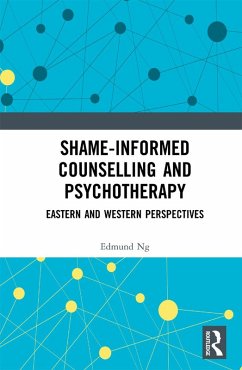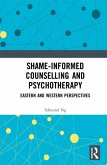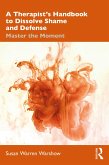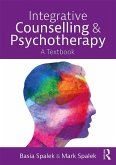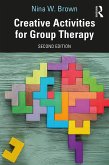Dieser Download kann aus rechtlichen Gründen nur mit Rechnungsadresse in A, B, BG, CY, CZ, D, DK, EW, E, FIN, F, GR, HR, H, IRL, I, LT, L, LR, M, NL, PL, P, R, S, SLO, SK ausgeliefert werden.
Eric Scalise
Former Chair of Counselling, Regent University, USA
Senior VP, Hope for the Heart
"Shame is ubiquitous in the therapy context-it is present in the attitudes and beliefs that discourage individuals from entering therapy in the first place, and it is also present throughout the work of therapy-regardless of therapeutic orientation. Moreover, empirical research has illuminated the many connections between shame and various psychological symptoms. However, what many don't realize or account for is the reality that the experience and expression of shame is profoundly shaped by culture. What I appreciate most about Shame-informed Counselling and Psychotherapy: Eastern and Western Perspectives is Dr Ng's nuanced, robust, culturally-sensitive, and honest approach to the topic of shame. I believe his work is well-positioned within an area of need in our field and I am pleased to endorse it."
David C. Wang
Associate Professor of Psychology, Biola University, USA
"It is gratifying to read an in-depth exploration about the core human experience of shame from an Asian scholar and clinician who understands the complex dynamics of both the Eastern and Western psyche. Dr Edmund Ng appreciates the complexity and nuances of shame from the sociocultural, interpersonal and intrapersonal perspectives. I applaud his presentation of the healthy aspects of shame, as well as the pervasive debilitating impact of unhealthy shame. In this book, he is able to provide an approach to counselling those who struggle with unhealthy shame that is both informative and sensitive. Dr Ng's insights are both clinically perceptive and compassionate."
Fred Gingrich
Professor of Counselling, Denver University, USA
"Shame-informed Counselling and Psychotherapy: Eastern and Western Perspectives by Dr Edmund Ng is a clearly written, culturally rich, clinically creative, and personally transparent book that will be very helpful to clinicians as well as scholars and researchers. He points out that shame underlies many psychological problems and shows us how to empathically and effectively address shame in therapy. I highly recommend it as essential reading!"
Siang-Yang Tan
Professor of Psychology, Fuller Theological Seminary, USA
Author of Counselling and Psychotherapy: A Christian Perspective
"In Shame-informed Counselling and Psychotherapy: Eastern and Western Perspectives, Dr Edmund Ng explores a life span developmental perspective of shame that may be functional or dysfunctional. His thesis that shame is the root emotion of many psychological problems is poignant for clinicians in Asia and the West. Dr Edmund like myself were raised in a shame-based Chinese culture in Malaysia but trained in western theories of psychotherapy. We had to grapple with integrating the different East-West worldviews. Edmund's book is the answer to our struggle with our cultural borderland utilizing the underlying theme of shame. It should be a required text for clinicians training to be cultural brokers in both the individualistic Western cultures and the collectivistic cultures of the East. Edmund artistically weaves a mixed research design and scholarly writing with practical suggestions for clinical practice. Further, his authentic self-disclosure of struggles with shame and coping with the loss of his first wife makes Shame Informed Counselling and Psychotherapy an enlightening and valuable read."
Ben Lim
Professor of Marriage and Family Therapy
Bethel University, USA
"This book fills a void in the psychotherapy and counselling literature and would be of great help to both the novice as well as the experienced therapist. I enjoyed reading it not only for its heuristic content but also for the many personal insights it gave me, especially in the chapter where the author shares his own experience of shame. Dr Ng unpacks much of the complexities of this emotion. When I was in training, I was told that Eastern peoples, unlike Westerners, don't feel guilt, but rather they feel shame. I knew this was incorrect and Dr Ng clearly shows that shame is a more basic underlying emotion that all peoples have, one that is often strenuously defended against. This well-referenced book gives good practical examples of conducting therapy to deal with shame. After reading it I think the issue of shame should play a more prominent role in our formulation of cases for therapy and in the training of therapists. This book is worthwhile reading for anyone in the psychotherapeutic field."
T. Maniam
Professor Emeritus of Psychiatry
National University of Malaysia, Kuala Lumpur

